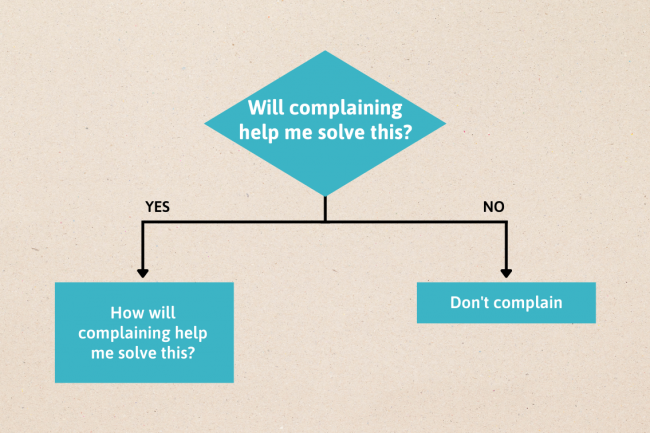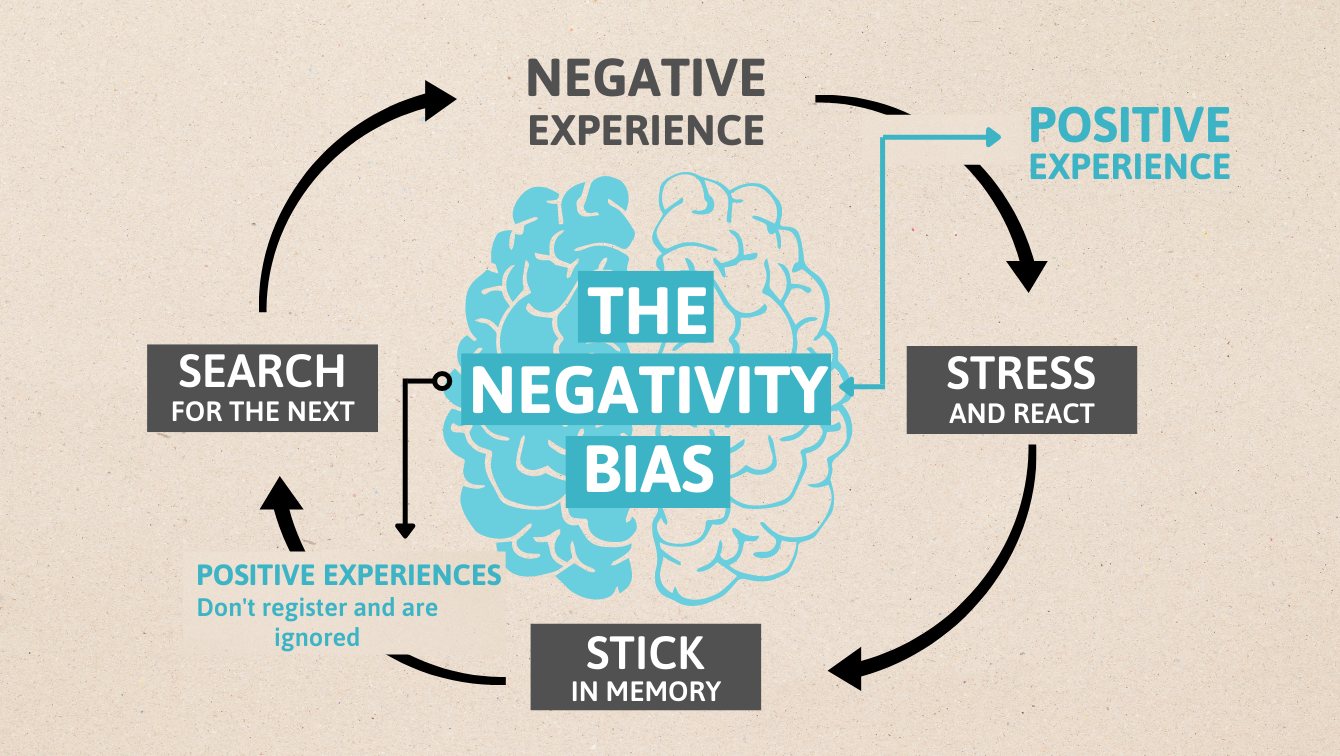Everyone complains from time to time, but chronic complaining that has become a habit can be hard to quit. Being negative and whining all the time serves no purpose. It can dampen your mood, and it can become annoying to the people around you over time. Maybe you have realized this. Perhaps you’ve already tried to complain less, but you haven’t managed to effectively stop it altogether.
In this article, we’ll give you practical, easy steps to help you stop complaining and criticizing everything. We will also share some reasons why people complain and answer some common questions about complaining.
Sections
How to stop complaining
It may be impossible to never complain, but if you can effectively learn to stop complaining or even learn how to complain less, you will experience many positive changes in your life. You’ll feel happier, and your relationships will improve. Though it will be a challenge to shift your mindset from a pessimistic, critical one to a more positive one, it is possible. It simply requires the right motivation and the willingness to practice thinking differently.
Here are 7 ways to stop complaining:
1. Raise your awareness
If you can learn how to catch yourself in the moment as you’re about to complain, this awareness can serve as a powerful catalyst for change.
To build a habit of being more self-aware, try using a physical reminder, such as wearing a rubber band around your wrist. When you’re about to complain, switch the rubber band to your other wrist and ask yourself these self-reflection questions:
- What am I looking to gain from voicing this complaint to this person—can they offer me support or help me find a solution?
- Am I complaining about something I can fix myself?
- Have I already complained about this?
Being able to pause and reflect in this way will stop you from complaining on auto-pilot.
2. Focus on solving the problem
Research has found that complaining that is focused on achieving some outcome, like solving a problem, can actually be a good thing.[1] The next time you feel the urge to complain, ask yourself whether complaining will help you resolve your problem. If the answer is yes, then ask yourself how?

Say you don’t like the way meetings are run at the workplace. Would complaining about this help fix the issue? If you were gossiping to a colleague about it day in and day out, then perhaps not. But what about going to the manager with your complaint and explaining the logic behind it? Your chances of fixing things would be much higher if you communicated with the right party in the right way.
3. Accept what cannot be changed
People sometimes complain because they are not satisfied with reality,[2] and they feel powerless to change it. Not every problem has a clear-cut solution, and in this case, venting to others about how you feel can be cathartic.
It’s when you continually rehash the same problems that even the most understanding and empathetic person can become annoyed. Doing this is not good for you either. Complaining to your boyfriend or girlfriend about how much you hate your job and about how you want to quit each day will just reinforce your negative feelings.[3]
Instead, practice acceptance. Tell yourself that this is just a season in your life—that things will not always be this way. Practicing acceptance will help you keep obsessive, negative thinking— and therefore complaining—at bay.[4]
4. Make gratitude your new attitude
People who complain a lot appear to be quite critical and to have a more pessimistic outlook. It seems that, somewhere along the line, grumbling and moaning have become a habit for them.
When it comes to stopping a bad habit, it’s usually not very effective to just tell yourself you’re going to quit. A better approach is to incorporate a good habit, with the aim that there will eventually be no more space for the bad one.[5]
Try to replace complaining with gratitude. Practice adopting a grateful mindset by keeping a gratitude journal. Each morning and each evening, write down 3 things that you’re thankful for. Over time, it will become easier to think in a more positive way, and you will be happier for it.
5. Trick your brain
It is easy to tell how someone is feeling by looking at their facial expression. When people smile, we assume they are happy. When people frown, we assume they are sad or angry. In typical circumstances, the feeling comes first, and the facial expression follows. However, research shows that this can work the other way, too.[6]
The “facial feedback theory”[6] says that the facial expressions we put on can make us feel the associated emotion. So, the next time you’re feeling dissatisfied and want to complain, put the theory to the test. Avoid scrunching up your face in dismay. Instead, try cracking a smile. Give it a few minutes to see if you feel any better.

6. Stop labeling everything
When people complain, it’s because they have judged a person or situation and labeled it as “bad,” “unacceptable,” or something similar. Personal judgment, according to ancient Stoic philosophy, is at the root of all human unhappiness and mental suffering.[7]
Stoic philosophers suggest that if people stop making judgments, they will have no room to be dissatisfied. Without dissatisfaction, there would be no complaining.[7]
So, the next time you are tempted to make a judgment about a situation, try describing it as neutrally as possible. Say you’re stuck in a traffic jam on the way to work. Avoid telling yourself what a pain it is and how it’s going to make you late. Simply take note of the facts: you’re commuting to work and have come to a temporary stop.
7. Speak to a therapist
Do you tend to complain a lot? Is it seriously impacting your mood and your overall quality of life? If so, then it may be worth seeking professional support.
A therapist will work with you to help you change unhelpful thinking patterns that cause you to complain all the time. They will also help you develop better ways to cope with your problems and communicate them to others so that they don’t overwhelm you.
We recommend BetterHelp for online therapy, since they offer unlimited messaging and a weekly session, and are cheaper than going to a therapist's office.
Their plans start at $64 per week. If you use this link, you get 20% off your first month at BetterHelp + a $50 coupon valid for any SocialSelf course: Click here to learn more about BetterHelp.
(To receive your $50 SocialSelf coupon, sign up with our link. Then, email BetterHelp’s order confirmation to us to receive your personal code. You can use this code for any of our courses.)
Why do people complain?
People complain for all sorts of reasons, but usually, complaints express dissatisfaction with something or someone. In venting their frustrations, people are looking to be heard, supported, and validated by others.
Here are 6 reasons why people complain:
1. Complaining can help regulate emotions (sometimes)
Research has shown that venting—expressing strong, negative emotions—can help people cope with stress. However, whether venting is helpful or not depends on the person who receives the complaint and how they respond to it.[8] For venting to be effective, the complainer needs to feel supported.
Another way that venting can fail to help regulate emotions is when it makes people feel worse afterward. Sometimes talking about negative emotions can enhance them. This can bring a person’s mood down further.[9] When venting happens too regularly, it can put a person in a chronic stress state, which can have health implications.[10]
If you have a tendency to vent too often, you might like this article on healthy ways to express your emotions.
2. Complaining can help people solve problems
Sometimes people complain because they are overwhelmed and do not know how to cope with some or other problem.
The fact that people are emotionally attached to their problems can make it hard for them to think rationally and problem-solve. If people are open to listen to others’ perspectives, then voicing complaints could help them find solutions that they’d otherwise be blind to[11]
3. Complaining may indicate depression
Chronic complaining could be a sign that someone is depressed.[12] When people are depressed, they tend to have a more pessimistic view of life.[13] They may be more likely to complain as a result of their tendency to focus on the negatives.
Chronic complaining could potentially lead to depression, too.[14] That’s because constant complaining trains the brain to think negatively. The more negative thoughts a person has, the more this style of thinking becomes ingrained.[11]

4. Complaining can be learned
If you grew up in a family environment where people complained a lot, or if you hang out with chronic complainers, chances are you may have picked up a bad habit.
Research shows that complaining can be somewhat contagious. If you hear others complaining often, it can make you pay attention to your own discontent. This will eventually urge you to complain, too.[15]
5. Complaining can meet an emotional need
Sometimes people complain as a way to meet emotional needs such as attention, sympathy, and support from others.[12]
When people complain and others respond favorably, it makes them feel good. It’s a kind of social bonding that activates the brain’s reward system.[2]
Common questions
Is constant complaining a mental illness?
There is no evidence to suggest that complaining is a sign of mental illness. However, since complaining can reinforce negative thinking and worsen your mood, doing it constantly could lead to mental health issues, like depression.[14]
Does complaining shorten your life?
Chronic complaining can increase levels of cortisol, a stress hormone, in the body.[10] Elevated cortisol in the body can affect physical health. So in this way, constant complaining has the potential to shorten your lifespan.
How does complaining affect relationships?
Complaining can drive a wedge between two people. This is especially true when one person complains about the same thing over and over again and won’t accept any advice for solving their problem. Complaining can also spread negativity as people tend to be affected by others’ mood states.[16]
You might like to learn more about this in this article on emotional contagion.
How do you live with a complainer?
Show them support by letting them know you understand how they feel. If that doesn’t work, try getting them to see their problem from a more objective perspective. If that fails, tell them that you want to be supportive but that you’re not prepared to listen to them if they keep refusing help.



Thank You
Thanks so much for this great advice